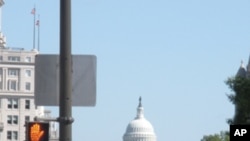U.S. voters head to the polls in less than six weeks to elect a new Congress and the results might have a major impact on President Barack Obama's ability to govern during the next two years. All 435 seats in the House of Representatives are at stake, along with 37 Senate seats and 37 state governorships.
Analysts say there appear to be two major factors at play that will have a profound impact on this year's midterm elections. First, the public has a negative view of the national economy, and that could hurt President Obama and his fellow Democrats in Congress. Second, conservative energy is on the rise. That will help Republican candidates, thanks largely to the grassroots Tea Party movement.
Julia Mcloud is a Tea Party supporter who attended a rally recently here in Washington. "We are concerned with what Congress is doing, what Obama is doing. We want less government. We don't want to be taxed so much."
Economy fuels concern
Driving much of that conservative anger is frustration with the national economy, especially the weak job market, said Quinnipiac University pollster Peter Brown.
"The economy is issues number one through 129," said Brown. "And by the economy, most people mean unemployment. And until the unemployment rate gets markedly better, it is unlikely that voters will be any more optimistic about the economy, and therefore that will probably not be good for President Obama."
Republicans also expect to gain congressional seats because of concern over a growing federal budget deficit and the size of government, said expert John Fortier of the American Enterprise Institute.
"I think the driving issue is that the opposition, Republicans and Tea Party people, don't like the direction the country's going in. They think the economy is bad and they think that government is getting too big," said Fortier.
Conservative edge vs. presidential pull
Among those leading the conservative charge is former Alaska Governor Sarah Palin. Palin is a favorite of Tea Party supporters and a possible presidential candidate two years from now. She spoke recently to Republicans in Iowa, the state that begins the presidential election cycle every four years with its party caucus voting.
"We can't wait until 2012 to get our country back on the right track," said Palin. "We need to start now by electing strong leaders who are not afraid to shake it up."
President Obama's public approval ratings have dropped steadily in recent months, but analysts said he remains the Democrats' best hope of keeping majorities in the House and Senate as he campaigns around the country.
"It is still fear versus hope, the past versus the future," said Obama. "It is still a choice between sliding backward and moving forward. That is what this election is about. That is the choice you will face in November."
Political analysts predict GOP gains
Political experts agree that Republicans will make gains in November. Pollster Peter Brown said the only question is, how many congressional seats will they win?
"Historically, the party that holds the White House loses seats in the off-year elections, and it would be a shock if the Democrats did not lose seats this year," said Brown. "The question is how many are they going to lose? There are a lot of people who think this will be a very, very good Republican year."
And the results might have a huge impact on President Obama's governing style and his ability to get things done, said analyst John Fortier.
"I think whatever the outcome - whether Republicans take the House or whether they fall a little bit short - it will look very different for the next two years," said Fortier. "It will be a time of either small accomplishments or of great conflict between the parties. There will be no time to work on other things on the big Obama legislative agenda."
Republicans need a gain of 39 seats to retake control of the House of Representatives, and a win of 10 seats to regain a majority in the Senate.




